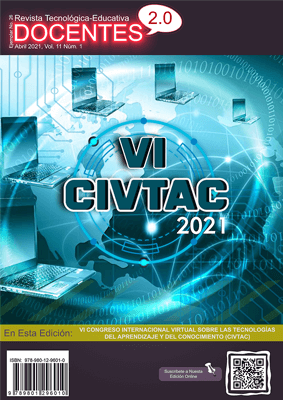Strategies for Evaluating Competencies in the Academic Performance of Psychology University Students
 DOI:
https://doi.org/10.37843/rted.v11i1.141
DOI:
https://doi.org/10.37843/rted.v11i1.141
Main Article Content
Abstract
Breaking with a traditional way of evaluating implies breaking structures, paradigms rooted in education. Higher education does not escape this; it must go from a simple theoretical evaluation to implement new ways of evaluating practically, making visible the application of what has been learned in the classroom. Besides, an efficient, effective, competent academic performance, responding to the National Educational System of the Holistic Model's guidelines to be, know, do, and decide. The present research aimed to determine the effectiveness of practice exams to improve academic performance. Training strategies with practical evaluation were proposed to two groups of the seventh grade of Psychology of Universidad San Francisco de Asís, of the morning and night shift, with different characteristics framed in a quasi-experimental approach comparative method allowing to see differences in both groups. Effective strategies are also evidenced; therefore, it is a mixed investigation, where both quantitative and qualitative results are obtained. The results allowed to compare in both groups, conditions, and characteristics to show if the strategies effectively or alter academic performance. These same findings raise new intervention and research challenges and the need for practical evaluations to improve academic performance effectively and competently. Every strategy is focused on the university student so that he can carry out practical assessments and at the same time improve his academic performance, demonstrating skills and abilities in addition to competencies that are considered based on the needs of the group.
Downloads
Metrics
Article Details

This work is licensed under a Creative Commons Attribution-NonCommercial-NoDerivatives 4.0 International License.
Those authors who have publications in our journal accept the following terms:
- When a work is accepted for publication, the author retains rights of reproduction, distribution of his/her article for exploitation in all countries of the world in the format provided by our magazine and any other magnetic medium, optical, and digital.
- Authors will retain their copyright and guarantee the journal the right first to publish their work, which will be simultaneously subject to the Creative Commons Acknowledgment License (Attribution-NonCommercial-NoDerivatives 4.0 International (CC BY-NC-ND 4.0)). That allows third parties to copy and redistribute the material in any medium or format, under the following conditions: Acknowledgment - You must properly acknowledge authorship, provide a link to the license, and indicate if any changes have been made. You may do so in any reasonable way, but not in a way that suggests you have the licensor's endorsement or receive it for your use. NonCommercial - You may not use the material for a commercial purpose. NoDerivatives - If you remix, transform, or build from the material, you cannot broadcast the modified material. There are no additional restrictions - You cannot apply legal terms or technological measures that legally restrict you from doing what the license allows.
- Authors may adopt other non-exclusive license agreements to distribute the published version of the work (e.g., deposit it in an institutional archive or publish it in a monographic volume) provided that the initial publication in this journal is indicated.
- Authors are allowed and recommended to disseminate their work through the Internet (e.g., in institutional telematic archives, repositories, libraries, or their website), producing exciting exchanges and increasing the published work's citations.
- Request of withdrawal an article has to be done in writing by the author to the Editor, becoming effective after a written response from the Editor. For this purpose, the author or authors will send correspondence via e-mail: [email protected].
- The author will not receive financial compensation for the publication of his work.
- All Docentes 2.0 Journal publications are under the Open Journal System (OJS) platform at: https://ojs.docentes20.com/.
References
Escudero, T. (2013). Utilidad y uso de las evaluaciones. Un asunto relevante, Revista de evaluación educativa.
Frayle, A, López, V. & Castejón, J. (2013). La evaluación formativa universitaria y el rendimiento Académico del alumno, Aula Abierta.
Gutierrez, C. (1997). La investigación total. Editorial Magisterio.
Hernández-Sampieri, R., Fernandez-Collado, C. & Baptista-Lucio, M. (2016). Metodología de la Investigación (5 ed.). McGraw-Hill Interamericana de España S.L.
Muela, S. & Hidalgo, H. (2018). Factores que inciden en el rendimiento académico de estudiantes del primer año de trabajo social, facultad ciencias sociales. repositorio.umsa.bo
Robledo, P. & García, J. (2009). El entorno familiar y su influencia en el rendimiento académico de los alumnos con dificultades de aprendizaje: revisión con estudios empíricos. Aula abierta 2009, dialnet.unirioja.es.
Sánchez-Pacheco, C. L. (2019). Gamificación: Un nuevo enfoque para la educación ecuatoriana. Revista Tecnológica-Educativa Docentes 2.0, 7(2), 96-105. https://ojs.docentes20.com/index.php/revista-docentes20/article/view/16
Santalla, Ch. (2012). Rendimiento académico en las universidades Bolivia. investigación.uap.edu.bo, Sientia, revista de investigación
Tintaya, P. (2016). Método de Investigación. www.bibvirtual.ucb.edu.bo
Valverde, X. (2017) La evaluación tradicional, vs. Evaluación alternativa en la FAREM Carazo, Revista Torreón Universitario, 6(15), 75-82. https://doi.org/10.5377/torreon.v0i15.5563 DOI: https://doi.org/10.5377/torreon.v0i15.5563
Vargas, G. (2007). Factores asociados al rendimiento académico, en estudiantes universitarios. Una Reflexión desde la calidad de la educación superior pública. Revista Educación universidad de Costa Rica, San José. Revista Educación 31
Villarroel, V. (2011). Relación entre auto concepto y rendimiento académico. Revista Psykhe. 10. 3-18.






